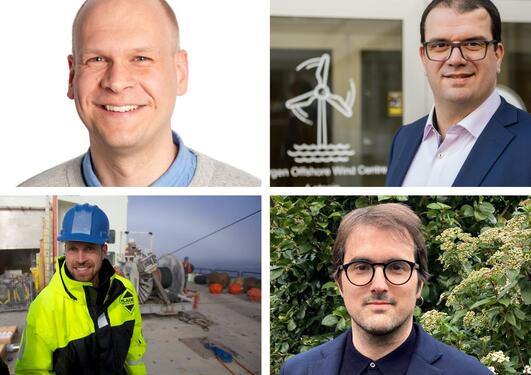ERC grants to Husebø and Valen
Bettina Husebø and Eivind Valen have received funding for ground-breaking research projects through the European Research Council (ERC). In total, UiB has been awarded six ERC Consolidator Grants in 2023.

Main content
Competing with over two thousand applicants, UiB researchers Bettina Husebø and Eivind Valen are among the 321 researchers who have been awarded the ERC Consolidator Grant 2022 from the European Research Council, ERC. This means that their large, innovative research projects receive two million euros in funding each, or around NOK 23 million over five years.
Rector Margareth Hagen congratulates thinks that it is fantastic that these two experienced researchers are able to explore their ideas further.
"They both study important topics and issues that can help improve our lives, and they use computer technology as an important element in their ground-breaking projects", she says.
How can technology be used to predict death in people with dementia?
Professor Bettina Husebø will lead the project 5-D: Decoding Death and Dying in people with Dementia by Digital thanotyping.
She is head of the Centre for Elderly and Nursing Home Medicine (SEFAS) at UiB and focuses in particular on people with dementia and issues relevant for this patient group.
She will study how assistive technology can be used to recognize symptoms among people with dementia who are near the end of life. By collecting data from nursing home patients, Husebø wants to develop methods and tools that can provide a more precise understanding of pain and symptoms at the end of life.
"Almost 40 per cent of people with dementia die unexpectedly", Bettina Husebø points out.
In this research project, Husebø will use so-called 5D technology to monitor the patients' pain and symptoms, behavioral changes/psychological symptoms and changes in oral patterns. The aim is to be able to better predict when the patients have reached the "point of no return", using advanced data sets.
Read more about the project: Professor Bettina Husebø will investigate how technology can be used to predict death
Ambitious project on a basic molecular biology mystery
Professor of bioinformatics Eivind Valen at the Computational Biology Unit (CBU), Michael Sars Centre and Department of Informatics has been awarded ERC funding for the project MaDCap: Mapping and Direct Sequencing of the Non-Canonical Cap Code.
Proteins are the machinery and building blocks of life. The instructions for making these proteins come from molecules known as messenger RNAs (mRNAs) which are copies of individual genes from the much larger DNA that comprises our genetic material. These mRNAs specify both which protein and how much of that protein should be made.
"This regulation is, to a large extent, determined by the various features of the mRNA. One of the most ubiquitous of these is the 5' cap, a structure that is attached to the start of a newly-synthesized mRNA. Several decades of research have revealed that the cap is a hub for regulating the levels of proteins that the mRNA produce. A less appreciated fact is that the mRNA caps can come in many different forms and be modified in several ways resulting in many different types of caps. The combination of these different features can be considered a cap code that can destine the mRNA for different fates", explains Valen.
The aim of the project is to develop a method that can determine caps and decipher the meaning of the cap code.
"The project will give insight into a very fundamental part of the cells' machinery. Caps are a crucial step on the way of expressing genes to proteins yet there are still many things we don't know", Valen adds.
Six ERC Consolidator Grants to UiB in 2023
In recent years, more researchers at UiB have applied for ERC funding, and more projects have been selected for funding. In 2023, UiB researchers have obtained six ERC Consolidator Grants. In addition to these two new projects, grants awarded to researchers Laundal, Gebhardt, Våge and Puy were announced in February.
"I am very happy to see that we are achieving good results in curiosity-driven research, and especially from the European Research Council. It forms the basis for important research activities at the university in the coming years", says Rector Hagen.
"This is also in line with UiB's new strategy, which emphasizes long-term research and aims to build up and further develop internationally leading academic communities", concludes Hagen.
All ERC funded projects hosted at UiB



